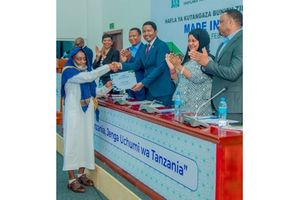JPM defends his economic management record, style

President John Magufuli fields questions from local and international journalists at State House in Dar es Salaam yesterday to mark his one year in the country’s highest office. PHOTO | STATE HOUSE
What you need to know:
- From a chemistry teacher to minister to president, it has been a long journey for the new Head of State
- He says he will continue with his cost-cutting measures, crackdown on corruption and instil discipline in public service as he seeks to put the country on the right economic footing.
Dar es Salaam. President John Magufuli yesterday sought to defend the way he has managed the economy during his first one year in office, reiterating that the days of benefitting from dirty money were over.
Responding to questions during his first live interview with editors from various media outlets in Dar es Salaam, Dr Magufuli said so far the economy was on the right track and that the government would meet most of its targets.
“Last year, the economy grew by 7 per cent. This year’s target is 7.2 per cent and going by the growth attained during the first half of this year, I’m optimistic that we will make it. Inflation has been contained down to 4.5 per cent. Growth is generally intact,” Dr Magufuli said during an interview that was broadcast live from State House.
He said his administration was hell-bent on creating an enabling environment for the private sector to thrive as he positions Tanzania on the right path to becoming an industrialised nation -- where the manufacturing sector’s contribution to the gross domestic product (GDP) will grow from the current 7.3 to 15 per cent come 2020.
This would be achieved when people spend a good chunk of their time working instead of angling what he called ‘dirty money’ through unscrupulous deals that leave millions of Tanzanians suffering due to a lack of quality social services.
In the endeavour to industrialise Tanzania, the government is undertaking a holistic approach that seeks to attract both public and private sector investment into various economic undertakings.
Currently, a Chinese investor is building a $100 million (Sh220 billion) tile factory at Mkiu Village, Mkuranga District, which will be the largest in East and Central Africa.
Similarly, investors from the world’s second largest economy are also planning to set up several small scale processing factories in Bagamoyo District while farmers also have a chance of selling up to Sh7 billion of cow peas to India, thanks to discussions conducted during a recent visit to Tanzania by India’s Prime Minister Narendra Modi.
He said cashews farmers in Mtwara and Lindi are currently enjoying good prices from about Sh1,000 per kilo to nearly Sh4,000 per kilo, thanks to the government’s initiatives in cutting the role of middlemen in the marketing system.
Similarly, according to President Magufuli, a Polish firm will soon set up a tractor assembling plant in Tanzania while Germans’ plans to build a $1 billion fertiliser plant in Lindi, which will employ a total of 10,000 people.
“So in short, people who work will never complain that their pockets are dry,” said Dr Magufuli.
The government, he said, is keen at attracting the right investors who will pay tax as a way of creating a level playing ground among business operators.
This echoed the remarks he made during his recent visit to Kenya. Investors from East Africa’s largest economy have invested a total of $1.7 billion (Sh3.4 trillion) into various sectors of Tanzania’s economy creating 56,260 jobs.
Dirty Money
In apparent reaction to sentiments raised by some Members of Parliament (MPs) earlier this week regarding a lack of enough liquidity in the economy -- occasioned by the government’s decision to order its institutions to transfer over Sh550 billion from various commercial banks and depositing the same with the Bank of Tanzania (BoT) – Dr Magufuli said he would not recant.
“I would rather be an unpopular president than become popular by impressing ‘deal makers’ for I’m sure one day, you will remember me and perhaps, I will become popular in heaven,” said Dr Magufuli, putting on a face that said a thousand words regarding his seriousness on the need to see Tanzania’s economy growing.
He said the decision was arrived at after a thorough analysis of how the funds found their way into commercial banks. What used to happen, he said, was that chief executive officers of government-owned institutions would keep billions of shillings in various commercial banks’ accounts at fixed deposit terms but the earned interest was between two and eight per cent only.
This was a far cry from the right rate which goes up to ten per cent. The CEO would benefit through kickbacks from commercial banks. Interestingly, the commercial banks would use the same money to loan the government by purchasing Treasury Bills and Treasury Bonds at exorbitant interest rates of between 14 and 16 per cent, he revealed.
With such deals, he said, most commercial banks preferred to do business with the government through its risk-free securities instead of giving loans to the productive sector.
“For a CEO who makes money through such deals, it may not be surprising to see him/her owning several houses in Sinza and conducting his/her institution’s meetings in Dubai. Such deals will never happen under my watch,” he insisted.
Politicians destroying banks
Meanwhile, President Magufuli took a swipe at politicians from both CCM and the Opposition accusing them of being the persons behind a swell in non-performing loans in commercial banks.
In apparent reference to Twiga Bancorp which was placed under the BoT’s receivership last week, President Magufuli said he smelt a rat during his very early days in office when he realised that the state-owned financial entity was going under.
However, no decision was taken until last week after the situation had gotten bad but worrying trend, he said, was that most of the bad loans were linked to politicians.
“If you search through the loan portfolios for most of the struggling banks, you will realise that most of the bad loans have been issued to politicians from both CCM and the Opposition. I want you journalists to dig deeper into this issue so they can be ashamed of what they are doing,” he said.
Cutting costs
Dr Magufuli said he will continue with his cost-cutting measures as he seeks to put the country on the right economic footing, revealing that since he came to power, he has received a total of 47 invitations that would see him travelling outside the country but he has so far managed to travel only to Rwanda, Uganda and Kenya, saving billions of shillings in the process.
The President chose to be represented by Tanzania’s envoys in the countries where he was invited to while in certain circumstances, he sent his Vice President, the Prime Minister or a cabinet minister.
“For a minister, you need just one or two people but if I were to go, I must have up to 40 people. This is what we mean by cutting costs so we can channel the saved money into social services,” he said.




